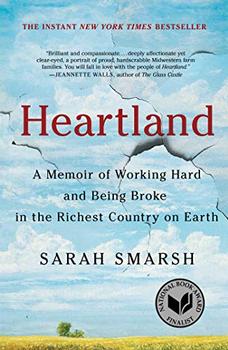Summary | Excerpt | Reading Guide | Reviews | Beyond the Book | Readalikes | Genres & Themes | Author Bio

A Memoir of Working Hard and Being Broke in the Richest Country on Earth
by Sarah Smarsh
Arnie was not one to act sad or complain. He had the gifts I would have wanted most for you: humor and generosity. He didn't register his own goodness, which was effortless and reliable. Grandma Betty used to get upset thinking he let people take advantage of him. What someone asked for, he gave if he could. And it wasn't because he was some salt-of-the-earth farmer. Plenty of farmers are jerks, and many favors went unreturned from the ten square miles or so that was our farming community. But Arnie didn't keep score. He just did his best every day, and the laugh that Betty liked that night on the Cotillion dance floor was a healing sound. He'd laugh so hard, his eyes squinted shut and filling with tears, that his whole big, bald head would turn red. It makes me laugh right now just to picture it.
I saw that laugh many times. When I was a little girl, I loved following him around the farm. There are quite a few pictures of me back then wearing frayed denim overalls and the look of a seasoned farmer on my face, s taring straight into the camera with my shoulders squared and my feet planted apart in a way that used to make my prim mother laugh. "Sturdy Gertie," she'd say and crack up.
I was small for my age but strong, and I rarely smiled at the camera—not because I was unhappy but because I didn't know that little girls were supposed to perform like that, I guess. Nobody in my family told me to act dainty. Plus, it was before all the digital screens that show people pictures of themselves in an instant. You could grow up relatively innocent of your own image. I see now that I looked like the spirit of an old man in the shape of a little girl.
Maybe that's another reason I liked Grandpa Arnie's middle name for you. The adjective form of the word means "dignified," "respected"—ideas we more often associate with old men than with little girls. I didn't realize it at the time, but they're also words we're more likely to associate with privileged classes of society.
Being born female and poor were the marks against my claim on respect, in the world's eyes, and I must have sensed it. Your name represents a corrective, or at least a defiance, on both counts.
I didn't even know "august" was a descriptive word and had no idea what it meant. People where I'm from don't use adjectives like "august." They don't use many adjectives at all. They speak a firm sort of poetry, made of things and actions.
Once I learned what "august" means, it was quite a few more years before I knew how to pronounce it. Like so much of my vocabulary, I learned it alone with a book but didn't hear it spoken aloud. In my head, I said it like the month.
It would be unwise for me to claim I know how much growing up in a poor family shaped my words. My mother's strong vocabulary, itself learned alone from books, probably has more to do with my language than any college degree I got. We can't really know what made us who we are. We can come to understand, though, what the world says we are.
When I found your name, in my early adulthood, I don't think I'd ever heard the term "white working class." The experience it describes contains both racial privilege and economic disadvantage, which can exist simultaneously. This was an obvious, apolitical fact for those of us who lived that juxtaposition every day. But it seemed to make some people uneasy, as though our grievance put us in competition with poor people of other races. Wealthy white people, in particular, seemed to want to distance themselves from our place and our truth. Our struggles forced a question about America that many were not willing to face: If a person could go to work every day and still not be able to pay the bills and the reason wasn't racism, what less articulated problem was afoot?
When I was growing up, the United States had convinced itself that class didn't exist here. I'm not sure I even encountered the concept until I read some old British novel in high school. This lack of acknowledgment at once invalidated what we were experiencing and shamed us if we tried to express it. Class was not discussed, let alone understood. This meant that, for a child of my disposition—given to prodding every family secret, to sifting through old drawers for clues about the mysterious people I loved—every day had the quiet underpinning of frustration. The defining feeling of my childhood was that of being told there wasn't a problem when I knew damn well there was.
Excerpted from Heartland by Sarah Smarsh. Copyright © 2018 by Sarah Smarsh. Excerpted by permission of Scribner. All rights reserved. No part of this excerpt may be reproduced or reprinted without permission in writing from the publisher.
I have always imagined that paradise will be a kind of library
Click Here to find out who said this, as well as discovering other famous literary quotes!
Your guide toexceptional books
BookBrowse seeks out and recommends the best in contemporary fiction and nonfiction—books that not only engage and entertain but also deepen our understanding of ourselves and the world around us.